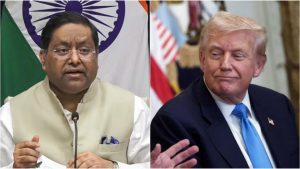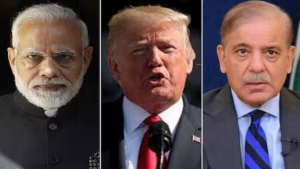New Delhi – The official India On Trump Nobel Prize Nomination response emerged on Friday when the Ministry of External Affairs (MEA) diplomatically sidestepped questions regarding the White House’s aggressive campaign for President Donald Trump to receive the Nobel Peace Prize. This measured diplomatic response reflects India’s careful approach to addressing American claims about conflict resolution.
During a press briefing, MEA spokesperson Randhir Jaiswal was directly questioned about the India On Trump Nobel Prize Nomination issue, specifically regarding White House assertions that Trump had ended several global conflicts, including the dispute between India and Pakistan. The spokesperson’s response demonstrated India’s preference for avoiding direct engagement with controversial American political narratives.
Diplomatic Deflection Strategy
The India On Trump Nobel Prize Nomination query received a characteristically diplomatic response from Jaiswal, who stated, “It is better to take this question to the White House.” This carefully crafted deflection avoids both endorsement and criticism of American claims while maintaining India’s traditional non-interference stance in foreign political processes.

This approach to the India On Trump Nobel Prize Nomination reflects New Delhi’s broader strategy of avoiding entanglement in American domestic political debates, particularly those involving disputed claims about international diplomatic achievements. The MEA’s response maintains diplomatic neutrality while neither validating nor challenging White House assertions.
White House Claims and International Conflict Resolution
The context surrounding the India On Trump Nobel Prize Nomination stems from White House Press Secretary Karoline Leavitt’s comprehensive advocacy for Trump’s Nobel Peace Prize candidacy. Leavitt claimed that Trump had “ended conflicts between Thailand and Cambodia, Israel and Iran, Rwanda and the Democratic Republic of the Congo, India and Pakistan, Serbia and Kosovo and Egypt and Ethiopia.”

The India On Trump Nobel Prize Nomination campaign specifically highlights alleged American mediation in the India-Pakistan conflict as evidence of Trump’s peace-making credentials. According to White House calculations, Trump brokered approximately one peace deal monthly during his six months in office, making him deserving of international recognition.
Leavitt’s statement that “It’s well past time that President Trump was awarded the Nobel Peace Prize” directly incorporates the India On Trump Nobel Prize Nomination narrative as supporting evidence for this assertion. This claim positions the alleged India-Pakistan ceasefire as a significant diplomatic achievement worthy of Nobel recognition.
India’s Historical Position on Bilateral Negotiations
The India On Trump Nobel Prize Nomination issue highlights a fundamental disagreement between New Delhi and Washington regarding the nature of India-Pakistan conflict resolution. India has consistently maintained that the cessation of hostilities between the two nations was achieved through bilateral negotiations rather than external mediation.
Also Read: US Deploys Nuclear Submarines In An Explosive Response to Russian Deputy’s War Threats
New Delhi’s rejection of Trump’s mediation claims creates complications for the India On Trump Nobel Prize Nomination narrative promoted by the White House. This disagreement represents a significant diplomatic challenge, as India’s official position directly contradicts the foundation of American Nobel Prize advocacy.
Despite repeated assertions from Trump linking trade deals to conflict resolution, India’s stance on the India On Trump Nobel Prize Nomination remains unchanged. The government continues to emphasize bilateral diplomatic processes rather than acknowledging American intervention in regional peace initiatives.
Pakistan’s Contrasting Position

While India maintains diplomatic distance from the India On Trump Nobel Prize Nomination campaign, Pakistan has embraced and actively supported Trump’s candidacy. Islamabad has publicly thanked Trump for allegedly brokering the India-Pakistan deal, creating a stark contrast with India’s position.
In June, Pakistan formally nominated Trump for the 2026 Nobel Peace Prize, specifically citing his “diplomatic intervention and pivotal leadership” during the India-Pakistan crisis. This Pakistani endorsement adds complexity to the India On Trump Nobel Prize Nomination debate by providing official support from one of the alleged beneficiaries.
The Pakistani government’s statement declared: “Government of Pakistan Recommends President Donald J. Trump for 2026 Nobel Peace Prize. The Government of Pakistan has decided to formally recommend President Donald J. Trump for the 2026 Nobel Peace Prize, in recognition of his decisive diplomatic intervention and pivotal leadership during the recent India-Pakistan crisis.”
International Recognition and Norwegian Nobel Committee


The India On Trump Nobel Prize Nomination campaign faces the ultimate test of international legitimacy through the Norwegian Nobel Committee’s evaluation process. Despite various endorsements and advocacy efforts, the Committee has maintained its traditional silence regarding Trump’s candidacy.
The Norwegian Nobel Committee’s approach to the India On Trump Nobel Prize Nomination reflects their standard practice of avoiding public commentary on potential candidates. This institutional discretion means that public advocacy campaigns, regardless of their intensity or political backing, do not necessarily influence final selection decisions.
Geopolitical Implications and Diplomatic Complexities
The India On Trump Nobel Prize Nomination issue illustrates broader challenges in contemporary international diplomacy, where domestic political narratives intersect with complex international relationships. India’s careful response demonstrates the delicate balance required when addressing claims that involve multiple stakeholders with differing perspectives.
The ongoing debate surrounding the India On Trump Nobel Prize Nomination reflects deeper questions about conflict resolution attribution, the role of external mediation in bilateral disputes, and the intersection of international recognition with domestic political objectives.
Future Diplomatic Considerations
As the India On Trump Nobel Prize Nomination campaign continues, India’s diplomatic strategy will likely maintain its current trajectory of non-engagement with American political narratives while preserving bilateral relationship stability. This approach allows India to protect its sovereignty over conflict resolution narratives while avoiding unnecessary diplomatic friction with the United States.

